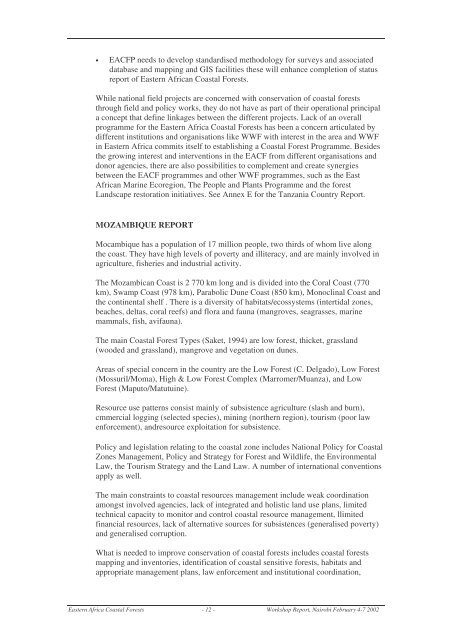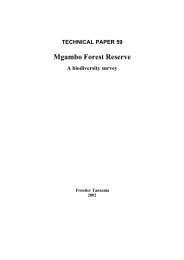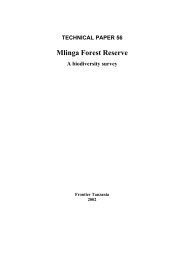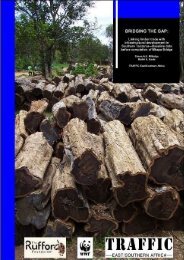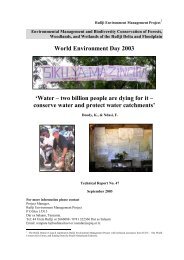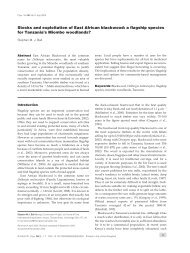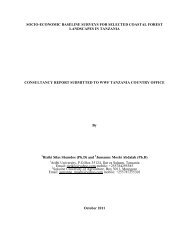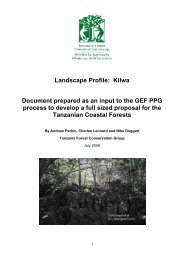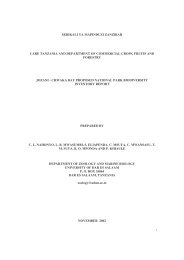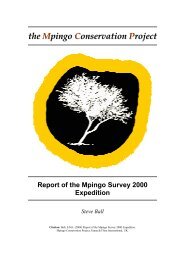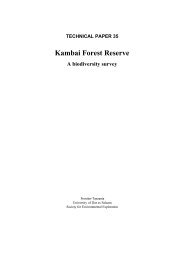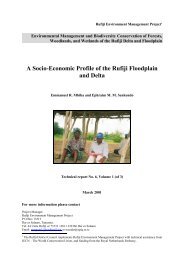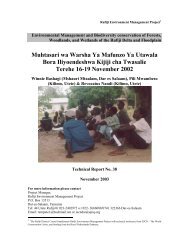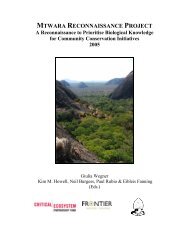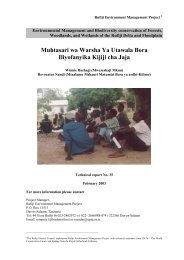Eastern Africa Coastal Forest Programme: Regional Workshop ...
Eastern Africa Coastal Forest Programme: Regional Workshop ...
Eastern Africa Coastal Forest Programme: Regional Workshop ...
Create successful ePaper yourself
Turn your PDF publications into a flip-book with our unique Google optimized e-Paper software.
• EACFP needs to develop standardised methodology for surveys and associated<br />
database and mapping and GIS facilities these will enhance completion of status<br />
report of <strong>Eastern</strong> <strong>Africa</strong>n <strong>Coastal</strong> <strong>Forest</strong>s.<br />
While national field projects are concerned with conservation of coastal forests<br />
through field and policy works, they do not have as part of their operational principal<br />
a concept that define linkages between the different projects. Lack of an overall<br />
programme for the <strong>Eastern</strong> <strong>Africa</strong> <strong>Coastal</strong> <strong>Forest</strong>s has been a concern articulated by<br />
different institutions and organisations like WWF with interest in the area and WWF<br />
in <strong>Eastern</strong> <strong>Africa</strong> commits itself to establishing a <strong>Coastal</strong> <strong>Forest</strong> <strong>Programme</strong>. Besides<br />
the growing interest and interventions in the EACF from different organisations and<br />
donor agencies, there are also possibilities to complement and create synergies<br />
between the EACF programmes and other WWF programmes, such as the East<br />
<strong>Africa</strong>n Marine Ecoregion, The People and Plants <strong>Programme</strong> and the forest<br />
Landscape restoration initiatives. See Annex E for the Tanzania Country Report.<br />
MOZAMBIQUE REPORT<br />
Mocambique has a population of 17 million people, two thirds of whom live along<br />
the coast. They have high levels of poverty and illiteracy, and are mainly involved in<br />
agriculture, fisheries and industrial activity.<br />
The Mozambican Coast is 2 770 km long and is divided into the Coral Coast (770<br />
km), Swamp Coast (978 km), Parabolic Dune Coast (850 km), Monoclinal Coast and<br />
the continental shelf . There is a diversity of habitats/ecossystems (intertidal zones,<br />
beaches, deltas, coral reefs) and flora and fauna (mangroves, seagrasses, marine<br />
mammals, fish, avifauna).<br />
The main <strong>Coastal</strong> <strong>Forest</strong> Types (Saket, 1994) are low forest, thicket, grassland<br />
(wooded and grassland), mangrove and vegetation on dunes.<br />
Areas of special concern in the country are the Low <strong>Forest</strong> (C. Delgado), Low <strong>Forest</strong><br />
(Mossuril/Moma), High & Low <strong>Forest</strong> Complex (Marromer/Muanza), and Low<br />
<strong>Forest</strong> (Maputo/Matutuine).<br />
Resource use patterns consist mainly of subsistence agriculture (slash and burn),<br />
cmmercial logging (selected species), mining (northern region), tourism (poor law<br />
enforcement), andresource exploitation for subsistence.<br />
Policy and legislation relating to the coastal zone includes National Policy for <strong>Coastal</strong><br />
Zones Management, Policy and Strategy for <strong>Forest</strong> and Wildlife, the Environmental<br />
Law, the Tourism Strategy and the Land Law. A number of international conventions<br />
apply as well.<br />
The main constraints to coastal resources management include weak coordination<br />
amongst involved agencies, lack of integrated and holistic land use plans, limited<br />
technical capacity to monitor and control coastal resource management, llimited<br />
financial resources, lack of alternative sources for subsistences (generalised poverty)<br />
and generalised corruption.<br />
What is needed to improve conservation of coastal forests includes coastal forests<br />
mapping and inventories, identification of coastal sensitive forests, habitats and<br />
appropriate management plans, law enforcement and institutional coordination,<br />
<strong>Eastern</strong> <strong>Africa</strong> <strong>Coastal</strong> <strong>Forest</strong>s - 12 - <strong>Workshop</strong> Report, Nairobi February 4-7 2002


